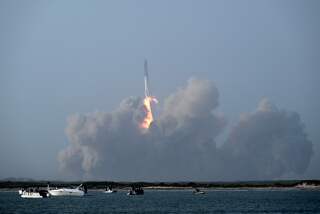Hereâs a look at the Pentagonâs images of the rocket launch that rattled California
The Pentagon has released its first images of a missile launch in the Pacific over the weekend that rattled Californians up and down the coast.
One dramatic image shows bright fire streaking from the tail a Trident II D5 missile as it launched Saturday night from the Ohio-class ballistic missile submarine Kentucky. The launch was one of two the Navy conducted during exercises off the Southern California coast and the 156th successful test flight of the missile, officials said.
A congressional delegation that included representatives from Arkansas and Indiana were able to watch Saturdayâs test, the Navy said.
A second successful test launch took place Monday afternoon, the Navy said. The blastoff took place with far less fanfare than Saturday nightâs launch, which provoked residents from San Francisco to Mexico to take to social media, posting photos of an eerie-looking, bluish-green plume smeared above the Pacific.
Speculation was wide-ranging, including rumors of an alien UFO visit.
The Navy later confirmed the missile launch as the source of the atmospheric display but would not say when additional launches might take place or disclose where the exercise was actually occurring.
âItâs important that we test these missiles for our national security,â said John M. Daniels, spokesman for the secretive Strategic Systems Programs office, which oversees the Navyâs nuclear-tipped missile arsenal. âWe donât announce future launches, but this is it for any time soon.â
The Kentucky conducted the two launches as part of a process that certifies the readiness of a submarineâs crew and strategic weapons before returning to operational availability.
It occurs after a submarine has its midlife nuclear refueling, which involves replacing the expended nuclear fuel in the submarineâs reactor with new fuel. The Kentucky entered Puget Sound Naval Shipyard in Bremerton, Wash., in February 2012 for an overhaul that ended in April.
The Navyâs fleet of 14 ballistic submarines can each carry 24 Trident missiles each tipped with 14 independently targetable thermonuclear warheads.
The Navy annually tests the Tridents on the West Coast, and on the East Coast near Florida.
The $31-million missile, built by Lockheed Martin Corp. in Sunnyvale, Calif., has had more than 150 successful launches since its first test in 1989. It is capable of hitting a target 4,000 nautical miles away.
The test on Saturday featured the launch of a missile outfitted with a dummy warhead toward the Kwajalein Atoll, a missile test site thatâs part of the Marshall Islands in the western Pacific.
While the risk of nuclear confrontation between the United States and Russia declined after the 1991 fall of the Soviet Union, it has never gone away.
The U.S. militaryâs nuclear weapons strategy rests on a triad of delivery systems â bombers, submarines and land-based missiles â developed early in the Cold War to deliver warheads anywhere in the world.
The Pentagon recently embarked on a $355-billion program for modernizing each aging leg of the U.S. nuclear triad over the next decade.
The submarine missile test came late Saturday after Defense Secretary Ashton Carter addressed a defense forum at the Ronald Reagan Presidential Library in Simi Valley about the U.S. âadapting our operational posture and contingency plansâ to deter Russiaâs âaggression.â
âWe do not seek a cold, let alone a hot, war with Russia,â he said to the forum. âWe do not seek to make Russia an enemy. But make no mistake; the United States will defend our interests, our allies, the principled international order, and the positive future it affords us all.â
For breaking California news, follow @wjhenn @JosephSerna.
Hoy: Léa esta historia en español
ALSO:
Bus passenger stabbed to death in Highland Park
2 Rancho Cucamonga caregivers held in group home abuse investigation
Burning SUV in Orange yields grim find: 3 bodies; homicide probe launched
More to Read
Sign up for Essential California
The most important California stories and recommendations in your inbox every morning.
You may occasionally receive promotional content from the Los Angeles Times.












